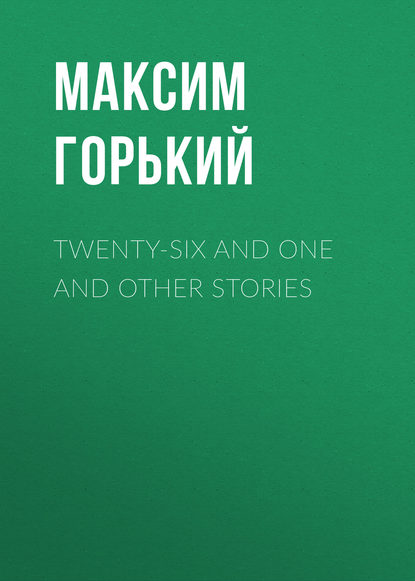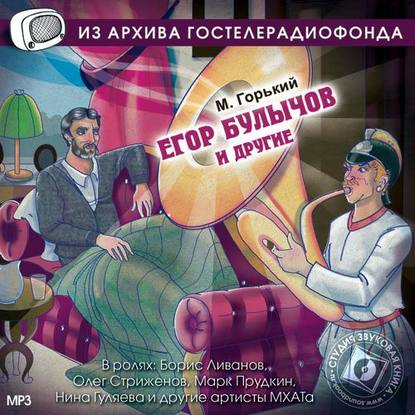 Полная версия
Полная версияПолная версия:
Максим Горький Twenty-six and One and Other Stories
- + Увеличить шрифт
- - Уменьшить шрифт

Maksim Gorky
Twenty-six and One and Other Stories
PREFACE
MAXIME GORKYRussian literature, which for half a century has abounded in happy surprises, has again made manifest its wonderful power of innovation. A tramp, Maxime Gorky, lacking in all systematic training, has suddenly forced his way into its sacred domain, and brought thither the fresh spontaneity of his thoughts and character. Nothing as individual or as new has been produced since the first novels of Tolstoy. His work owes nothing to its predecessors; it stands apart and alone. It, therefore, obtains more than an artistic success, it causes a real revolution.
Gorky was born of humble people, at Nizhni-Novgorod, in 1868 or 1869, – he does not know which – and was early left an orphan. He was apprenticed to a shoemaker, but ran away, a sedentary life not being to his taste. He left an engraver's in the same manner, and then went to work with a painter of ikoni, or holy pictures. He is next found to be a cook's boy, then an assistant to a gardener. He tried life in these diverse ways, and not one of them pleased him. Until his fifteenth year, he had only had the time to learn to read a little; his grandfather taught him to read a prayer-book in the old Slav dialect. He retained from his first studies only a distaste for anything printed until the time when, cook's boy on board a steam-boat, he was initiated by the chief cook into more attractive reading matter. Gogol, Glebe Ouspenski, Dumas pere were revelations to him. His imagination took fire; he was seized with a "fierce desire" for instruction. He set out for Kazan, "as though a poor child could receive instruction gratuitously," but he soon perceived that "it was contrary to custom." Discouraged, he became a baker's boy with the wages of three rubles (about $1.50) a month. In the midst of worse fatigue and ruder privations, he always recalls the bakery of Kazan with peculiar bitterness; later, in his story, "Twenty-Six and One," he utilized this painful remembrance: "There were twenty-six of us – twenty-six living machines, locked up in a damp cellar, where we patted dough from morning till night, making biscuits and cakes. The windows of our cellar looked out into a ditch, which was covered with bricks grown green from dampness, the window frames were obstructed from the outside by a dense iron netting, and the light of the sun could not peep in through the panes, which were covered with flour dust.."
Gorky dreamed of the free air. He abandoned the bakery. Always reading, studying feverishly, drinking with vagrants, expending his strength in every possible manner, he is one day at work in a saw-mill, another, 'longshoreman on the quays… In 1888, seized with despair, he attempted to kill himself. "I was," said he, "as ill as I could be, and I continued to live to sell apples.." He afterward became a gate-keeper and later retailed kvass in the streets. A happy chance brought him to the notice of a lawyer, who interested himself in him, directed his reading and organized his instruction. But his restless disposition drew him back to his wandering life; he traveled over Russia in every direction and tried his hand at every trade, including, henceforth, that of man of letters.
He began by writing a short story, "Makar Tchoudra," which was published by a provincial newspaper. It is a rather interesting work, but its interest lies more, frankly speaking, in what it promises than in what it actually gives. The subject is rather too suggestive of certain pieces of fiction dear to the romantic school.
Gorky's appearance in the world of literature dates from 1893. He had at this time, the acquaintance of the writer Korolenko, and, thanks to him, soon published "Tchelkache," which met with a resounding success. Gorky henceforth rejects all traditional methods, and free and untrammeled devotes himself to frankly and directly interpreting life as he sees it. As he has, so far, lived only in the society of tramps, himself a tramp, and one of the most refractory, it has been reserved for him to write the poem of vagrancy.
His preference is for the short story. In seven years, he has written thirty, contained in three volumes, which in their expressive brevity sometimes recall Maupassant.
The plot is of the simplest. Sometimes, there are only two personages: an old beggar and his grandson, two workmen, a tramp and a Jew, a baker's boy and his assistant, two companions in misery.
The interest of these stories does not lie in the unraveling of an intricate plot. They are rather fragments of life, bits of biography covering some particular period, without reaching the limits of a real drama. And these are no more artificially combined than are the events of real life.
Everything that he relates, Gorky has seen. Every landscape that he describes has been seen by him in the course of his adventurous existence. Each detail of this scenery is fraught for him with some remembrance of distress or suffering. This vagrant life has been his own. These tramps have been his companions, he has loved or hated them. Therefore his work is alive with what he has almost unconsciously put in of himself. At the same time, he knows how to separate himself from his work; the characters introduced live their own lives, independent of his, having their own characters and their own individual way of reacting against the common misery. No writer has to a greater degree the gift of objectivity, while at the same time freely introducing himself into his work.
Therefore, his tramps are strikingly truthful. He does not idealise them; the sympathy that their strength, courage, and independence inspire in him does not blind him. He conceals neither their faults, vices, drunkenness nor boastfulness. He is without indulgence for them, and judges them discriminatingly. He paints reality, but without, for all that, exaggerating ugliness. He does not avoid painful or coarse scenes; but in the most cynical passages he does not revolt because it is felt that he only desires to be truthful, and not to excite the emotions by cheap means. He simply points out that things are as they are, that there is nothing to be done about it, that they depend upon immutable laws. Accordingly all those sad, even horrible spectacles are accepted as life itself. To Gorky, the spectacle presented by these characters is only natural: he has seen them shaken by passion as the waves by the wind, and a smile pass over their souls like the sun piercing the clouds. He is, in the true acceptation of the term, a realist.
The introduction of tramps in literature is the great innovation of Gorky. The Russian writers first interested themselves in the cultivated classes of society; then they went as far as the moujik. The "literature of the moujik," assumed a social importance. It had a political influence and was not foreign to the abolition of serfdom.
In the story "Malva," Gorky offers us two characteristic types of peasants who become tramps by insensible degrees; almost without suspecting it, through the force of circumstances. One of them is Vassili. When he left the village, he fully intended to return. He went away to earn a little money for his wife and children. He found employment in a fishery. Life was easy and joyous. For a while he sent small sums of money home, but gradually the village and the old life faded away and became less and less real. He ceased to think of them. His son Iakov came to seek him and to procure work for himself for a season. He had the true soul of a peasant.
Later he falls, like the others, under the spell of this easy, free life, and one feels that Iakov will never more return to the village.
In Gorky's eyes, his work is tainted by a capital vice. It is unsuited to producing the joy that quickens. Humanity has forgotten joy; what has he done beyond pitying or rallying suffering?.. These reflections haunt him, and this doubt of his beneficent efficacy imparts extreme sadness to his genius.
IVAN STRANNIK.
Twenty-Six and One
BY MAXIME GORKYThere were twenty-six of us – twenty-six living machines, locked up in a damp cellar, where we patted dough from morning till night, making biscuits and cakes. The windows of our cellar looked out into a ditch, which was covered with bricks grown green from dampness, the window frames were obstructed from the outside by a dense iron netting, and the light of the sun could not peep in through the panes, which were covered with flour-dust. Our proprietor stopped up our windows with iron that we might not give his bread to the poor or to those of our companions who, being out of work, were starving; our proprietor called us cheats and gave us for our dinner tainted garbage instead of meat.
It was stifling and narrow in our box of stone under the low, heavy ceiling, covered with smoke-black and spider-webs. It was close and disgusting within the thick walls, which were spattered with stains of mud and mustiness… We rose at five o'clock in the morning, without having had enough sleep, and, dull and indifferent, we seated ourselves by the table at six to make biscuits out of the dough, which had been prepared for us by our companions while we were asleep. And all day long, from morning till ten o'clock at night, some of us sat by the table rolling out the elastic dough with our hands, and shaking ourselves that we might not grow stiff, while the others kneaded the dough with water. And the boiling water in the kettle, where the cracknels were being boiled, was purring sadly and thoughtfully all day long; the baker's shovel was scraping quickly and angrily against the oven, throwing off on the hot bricks the slippery pieces of dough. On one side of the oven, wood was burning from morning till night, and the red reflection of the flame was trembling on the wall of the workshop as though it were silently mocking us. The huge oven looked like the deformed head of a fairy-tale monster. It looked as though it thrust itself out from underneath the floor, opened its wide mouth full of fire, and breathed on us with heat and stared at our endless work through the two black air-holes above the forehead. These two cavities were like eyes – pitiless and impassible eyes of a monster: they stared at us with the same dark gaze, as though they had grown tired of looking at slaves, and expecting nothing human from them, despised them with the cold contempt of wisdom. Day in and day out, amid flour-dust and mud and thick, bad-odored suffocating heat, we rolled out the dough and made biscuits, wetting them with our sweat, and we hated our work with keen hatred; we never ate the biscuit that came out of our hands, preferring black bread to the cracknels. Sitting by a long table, one opposite the other – nine opposite nine – we mechanically moved our hands, and fingers during the long hours, and became so accustomed to our work that we no longer ever followed the motions of our hands. And we had grown so tired of looking at one another that each of us knew all the wrinkles on the faces of the others. We had nothing to talk about, we were used to this and were silent all the time, unless abusing one another – for there is always something for which to abuse a man, especially a companion. But we even abused one another very seldom. Of what can a man be guilty when he is half dead, when he is like a statue, when all his feelings are crushed under the weight of toil? But silence is terrible and painful only to those who have said all and have nothing more to speak of; but to those who never had anything to say – to them silence is simple and easy… Sometimes we sang, and our song began thus: During work some one would suddenly heave a sigh, like that of a tired horse, and would softly start one of those drawling songs, whose touchingly caressing tune always gives ease to the troubled soul of the singer. One of us sang, and at first we listened in silence to his lonely song, which was drowned and deafened underneath the heavy ceiling of the cellar, like the small fire of a wood-pile in the steppe on a damp autumn night, when the gray sky is hanging over the earth like a leaden roof. Then another joined the singer, and now, two voices soar softly and mournfully over the suffocating heat of our narrow ditch. And suddenly a few more voices take up the song – and the song bubbles up like a wave, growing stronger, louder, as though moving asunder the damp, heavy walls of our stony prison.
All the twenty-six sing; loud voices, singing in unison, fill the workshop; the song has no room there; it strikes against the stones of the walls, it moans and weeps and reanimates the heart by a soft tickling pain, irritating old wounds and rousing sorrow.
The singers breathe deeply and heavily; some one unexpectedly leaves off his song and listens for a long time to the singing of his companions, and again his voice joins the general wave. Another mournfully exclaims, Eh! sings, his eyes closed, and it may be that the wide, heavy wave of sound appears to him like a road leading somewhere far away, like a wide road, lighted by the brilliant sun, and he sees himself walking there..
The flame is constantly trembling in the oven, the baker's shovel is scraping against the brick, the water in the kettle is purring, and the reflection of the fire is trembling on the wall, laughing in silence… And we sing away, with some one else's words, our dull sorrow, the heavy grief of living men, robbed of sunshine, the grief of slaves. Thus we lived, twenty-six of us, in the cellar of a big stony house, and it was hard for us to live as though all the three stories of the house had been built upon our shoulders.
But besides the songs, we had one other good thing, something we all loved and which, perhaps, came to us instead of the sun. The second story of our house was occupied by an embroidery shop, and there, among many girl workers, lived the sixteen year old chamber-maid, Tanya. Every morning her little, pink face, with blue, cheerful eyes, leaned against the pane of the little window in our hallway door, and her ringing, kind voice cried to us: "Little prisoners! Give me biscuits!"
We all turned around at this familiar, clear sound and joyously, kind-heartedly looked at the pure maiden face as it smiled to us delightfully. We were accustomed and pleased to see her nose flattened against the window-pane, and the small, white teeth that flashed from under her pink lips, which were open with a smile. We rush to open the door for her, pushing one another; she enters, cheerful and amiable, and holding out her apron. She stands before us, leaning her head somewhat on one side and smiles all the time. A thick, long braid of chestnut hair, falling across her shoulder, lies on her breast. We, dirty, dark, deformed men, look up at her from below – the threshold was four steps higher than the floor – we look at her, lifting our heads upwards, we wish her a good morning. We say to her some particular words, words we use for her alone. Speaking to her our voices are somehow softer, and our jokes lighter. Everything is different for her. The baker takes out a shovelful of the brownest and reddest biscuits and throws them cleverly into Tanya's apron.
"Look out that the boss doesn't see you!" we always warn her. She laughs roguishly and cries to us cheerfully:
"Good-by, little prisoners!" and she disappears quickly, like a little mouse. That's all. But long after her departure we speak pleasantly of her to one another. We say the very same thing we said yesterday and before, because she, as well as we and everything around us, is also the same as yesterday and before. It is very hard and painful for one to live, when nothing changes around him, and if it does not kill his soul for good, the immobility of the surroundings becomes all the more painful the longer he lives. We always spoke of women in such a manner that at times we were disgusted at our own rude and shameless words, and this is quite clear, for the women we had known, perhaps, never deserved any better words. But of Tanya we never spoke ill. Not only did none of us ever dare to touch her with his hand, she never even heard a free jest from us. It may be that this was because she never stayed long with us; she flashed before our eyes like a star coming from the sky and then disappeared, or, perhaps, because she was small and very beautiful, and all that is beautiful commands the respect even of rude people. And then, though our hard labor had turned us into dull oxen, we nevertheless remained human beings, and like all human beings, we could not live without worshipping something. We had nobody better than she, and none, except her, paid any attention to us, the dwellers of the cellar; no one, though tens of people lived in the house. And finally – this is probably the main reason – we all considered her as something of our own, as something that existed only because of our biscuits. We considered it our duty to give her hot biscuits and this became our daily offering to the idol, it became almost a sacred custom which bound us to her the more every day. Aside from the biscuits, we gave Tanya many advices – to dress more warmly, not to run fast on the staircase, nor to carry heavy loads of wood. She listened to our advice with a smile, replied to us with laughter and never obeyed us, but we did not feel offended at this. All we needed was to show that we cared for her. She often turned to us with various requests. She asked us, for instance, to open the heavy cellar door, to chop some wood. We did whatever she wanted us to do with joy, and even with some kind of pride.
But when one of us asked her to mend his only shirt, she declined, with a contemptuous sneer.
We laughed heartily at the queer fellow, and never again asked her for anything. We loved her; all is said in this. A human being always wants to bestow his love upon some one, although he may sometime choke or slander him; he may poison the life of his neighbor with his love, because, loving, he does not respect the beloved. We had to love Tanya, for there was no one else we could love.
At times some one of us would suddenly begin to reason thus:
"And why do we make so much of the girl? What's in her? Eh? We have too much to do with her." We quickly and rudely checked the man who dared to say such words. We had to love something. We found it out and loved it, and the something which the twenty-six of us loved had to be inaccessible to each of us as our sanctity, and any one coming out against us in this matter was our enemy. We loved, perhaps, not what was really good, but then we were twenty-six, and therefore we always wanted the thing dear to us to be sacred in the eyes of others. Our love is not less painful than hatred. And perhaps this is why some haughty people claim that our hatred is more flattering than our love. But why, then, don't they run from us, if that is true?
Aside from the biscuit department our proprietor had also a shop for white bread; it was in the same house, separated from our ditch by a wall; the bulochniks (white-bread bakers), there were four of them, kept aloof, considering their work cleaner than ours, and therefore considering themselves better than we were; they never came to our shop, laughed at us whenever they met us in the yard; nor did we go to them. The proprietor had forbidden this for fear lest we might steal loaves of white bread. We did not like the bulochniks, because we envied them. Their work was easier than ours, they were better paid, they were given better meals, theirs was a spacious, light workshop, and they were all so clean and healthy – repulsive to us; while we were all yellow, and gray, and sickly. During holidays and whenever they were free from work they put on nice coats and creaking boots; two of them had harmonicas, and they all went to the city park; while we had on dirty rags and burst shoes, and the city police did not admit us into the park – could we love the bulochniks?
One day we learned that one of their bakers had taken to drink, that the proprietor had discharged him and hired another one in his place, and that the other one was a soldier, wearing a satin vest and a gold chain to his watch. We were curious to see such a dandy, and in the hope of seeing him we, now and again, one by one, began to run out into the yard.
But he came himself to our workshop. Kicking the door open with his foot, and leaving it open, he stood on the threshold, and smiling, said to us:
"God help you! Hello, fellows!" The cold air, forcing itself in at the door in a thick, smoky cloud, was whirling around his feet; he stood on the threshold, looking down on us from above, and from under his fair, curled moustache, big, yellow teeth were flashing. His waistcoat was blue, embroidered with flowers; it was beaming, and the buttons were of some red stones. And there was a chain too. He was handsome, this soldier, tall, strong, with red cheeks, and his big, light eyes looked good – kind and clear. On his head was a white, stiffly-starched cap, and from under his clean apron peeped out sharp toes of stylish, brightly shining boots.
Our baker respectfully requested him to close the door; he did it without haste, and began to question us about the proprietor. Vieing with one another, we told him that our "boss" was a rogue, a rascal, a villain, a tyrant, everything that could and ought to be said of our proprietor, but which cannot be repeated here. The soldier listened, stirred his moustache and examined us with a soft, light look.
"And are there many girls here?" he asked, suddenly.
Some of us began to laugh respectfully, others made soft grimaces; some one explained to the soldier that there were nine girls.
"Do you take advantage?".. asked the soldier, winking his eye.
Again we burst out laughing, not very loud, and with a confused laughter. Many of us wished to appear before the soldier just as clever as he was, but not one was able to do it. Some one confessed, saying in a low voice:
"It is not for us.".
"Yes, it is hard for you!" said the soldier with confidence, examining us fixedly. "You haven't the bearing for it.. the figure – you haven't the appearance, I mean! And a woman likes a good appearance in a man. To her it must be perfect, everything perfect! And then she respects strength… A hand should be like this!" The soldier pulled his right hand out of his pocket. The shirt sleeve was rolled up to his elbow. He showed his hand to us… It was white, strong, covered with glossy, golden hair.
"A leg, a chest, in everything there must be firmness. And then, again, the man must be dressed according to style… As the beauty of things requires it. I, for instance, I am loved by women. I don't call them, I don't lure them, they come to me of themselves." He seated himself on a bag of flour and told us how the women loved him and how he handled them boldly. Then he went away, and when the door closed behind him with a creak, we were silent for a long time, thinking of him and of his stories. And then suddenly we all began to speak, and it became clear at once that he pleased every one of us. Such a kind and plain fellow. He came, sat awhile and talked. Nobody came to us before, nobody ever spoke to us like this; so friendly… And we all spoke of him and of his future successes with the embroidery girls, who either passed us by, closing their lips insultingly, when they met us in the yard, or went straight on as if we had not been in their way at all. And we always admired them, meeting them in the yard, or when they went past our windows – in winter dressed in some particular hats and in fur coats, in summer in hats with flowers, with colored parasols in their hands. But thereafter among ourselves, we spoke of these girls so that had they heard it, they would have gone mad for shame and insult.
"However, see that he doesn't spoil Tanushka, too!" said the baker, suddenly, with anxiety.
We all became silent, dumb-founded by these words. We had somehow forgotten Tanya; it looked as though the soldier's massive, handsome figure prevented us from seeing her. Then began a noisy dispute. Some said that Tanya would not submit herself to this, others argued that she would not hold out against the soldier; still others said that they would break the soldier's bones in case he should annoy Tanya, and finally all decided to look after the soldier and Tanya, and to warn the girl to be on guard against him… This put an end to the dispute.







